Debt Collection in Europe – Has the Market Lost Its Mojo?
Debt Collection Market Size Europe: Is the Industry Losing Steam?
Debt collection market size europe is currently valued at approximately €19.6 billion in 2024 and is projected to experience growth driven by technological investments and rising debt levels.
To quickly summarize:
- 2024 Market Size: €19.6 billion
- Forecast: Expected CAGR of 11.32% through to 2033
- Largest Markets: UK and Germany ranking at the top
But despite these numbers, the industry faces considerable challenges, like economic uncertainty, stringent regulations, and technology shifts. These factors are raising questions among small business owners: Is Europe's debt collection market losing its mojo? Or is it ripe for revitalization?
I'm Kevin Simon, a Senior Debt Collection Specialist at Cosmopolite Business Debt Collection Agency, with over 20 years of global experience, dealing directly with issues related to debt collection market size europe. Having managed debt recovery projects for companies like Samsung and Volkswagen, I've seen the shifts that define this market.

The Current Debt Collection Market Size in Europe
Let's talk numbers. The debt collection market size Europe currently stands at a robust €19.6 billion in 2024. But here's the interesting part – this figure reflects an industry in transition rather than one in decline.
Over the past five years, we've seen some contraction, with revenue declining at a compound annual rate of 3.8% between 2019 and 2024. However, the future looks considerably brighter. Market projections suggest growth to USD 4.31 billion by 2033 from USD 1.83 billion in 2025 – representing an impressive CAGR of 11.32%.
Having worked with clients across Europe at Cosmopolite, I've witnessed how market conditions vary dramatically from country to country:
CountryMarket Size (2024)Growth RateKey DriversUK£1.9bn5.2% (2024)Financial services sector, automation demandGermany€2.7bn (est.)~12% (projected)Developed financial sector, lending activityFrance€1.8bn (est.)8.3% (projected)Digital change, regulatory changesItaly€1.4bn (est.)7.1% (projected)High number of collection businessesSpain€1.1bn (est.)6.5% (projected)Financial services growth, digitalization
With offices spanning London, Paris, Madrid and major cities across Europe, we've developed unique insights into these regional variations – and trust me, they matter when it comes to effective debt recovery strategies!
Europe's Debt Collection Market in Numbers
The statistics tell a fascinating story about where the industry stands today. The European debt collection software market alone reached USD 1.64 billion in 2024, highlighting technology's growing role in modern recovery processes.
What's particularly encouraging is the projected growth trajectory. The European debt collection software market is expected to expand from USD 1.32 billion in 2024 to USD 2.9 billion by 2032 – that's a healthy CAGR of 10.3%. Some analysts are even more optimistic, suggesting the market could reach USD 4.31 billion by 2033.
Behind these big numbers lie some revealing insights:
Over 60% of European businesses struggled with late payment management in 2022 – a challenge we see regularly among our clients. Non-performing loans (NPLs) represented about 3.2% of total loans across the EU last year, creating significant recovery opportunities.
On the positive side, digital change initiatives have helped financial institutions slash operational costs by up to 30%. The industry remains substantial, with approximately 10,801 businesses operating across Europe, and job growth has maintained a modest but positive CAGR of 0.5%.

Key Market Segments and Dynamics
The European debt collection landscape isn't monolithic – it's a diverse ecosystem with several distinct segments, each with its own dynamics and growth patterns.
By Component, the market divides into software and services. Software dominates with approximately 65.1% market share in 2024, streamlining recovery processes and ensuring better regulatory compliance. The services segment – including consulting, integration and support – is smaller but growing faster, with projections suggesting a CAGR of 13.10%.
When it comes to deployment models, cloud-based solutions have taken the lead with 60.1% market share in 2024. Their popularity stems from scalability, cost-effectiveness, and improved accessibility – qualities that have become increasingly important in our post-pandemic world. On-premise deployment remains significant, particularly among organizations with stringent security requirements or complex legacy systems.
Looking at organization size, it's interesting to note that SMEs account for approximately 55.1% of the market. This reflects the growing recognition among smaller businesses that professional debt recovery isn't just for corporate giants. Large enterprises hold a smaller share but are expected to grow at an impressive CAGR of 14.2%, driven by their need for comprehensive, integrated solutions.
The market also segments by debt type, with bad debt representing more than 60% of the segment. This reflects the significant challenge of recovering delinquent accounts – something we specialize in at Cosmopolite. Early out debt focuses on accounts that are only recently past due and typically easier to recover.
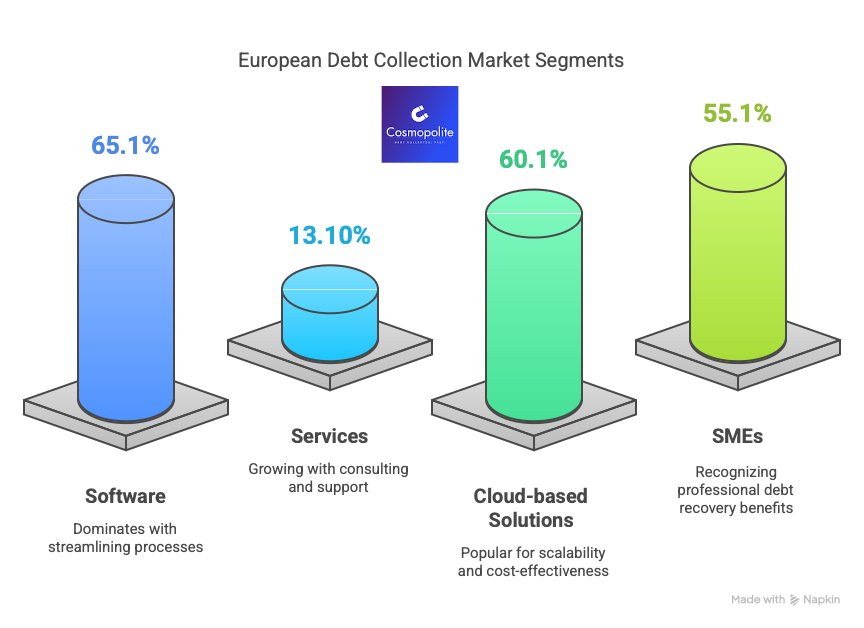
Finally, when we look at collection methods, the market divides into first-party collections (where creditors collect debts themselves), third-party collections (where specialized agencies like ours are engaged), and legal collections (involving court proceedings).
In our experience at Cosmopolite, we've seen third-party collections become increasingly effective as businesses recognize the value of specialized expertise. This trend aligns perfectly with the overall market trajectory – an industry that's not losing steam but rather changing and modernizing to meet evolving economic challenges.
Economic and Regulatory Factors Impacting the Market
Navigating Europe's debt collection landscape isn't just about numbers—it's also about understanding the complex economic and regulatory environment. If you're wondering why this matters, think of it like baking a cake: even the best ingredients won't help if you're baking in a hurricane!
Over the past few years, Europe's economic conditions have certainly felt stormy. First came the COVID-19 pandemic, shaking up nearly every industry. Then, as businesses began to recover, Europe faced a wave of rising inflation and interest rates, creating a real cost-of-living crisis.
In the UK, for example, the Bank of England raised interest rates 14 times between December 2021 and August 2023. Imagine borrowers juggling this many rate hikes while keeping their businesses afloat—it hasn't exactly been a walk in the park.

These economic ups and downs have created an interesting dynamic for debt collection agencies. On one side, more financial stress leads to higher debt levels, meaning potentially more business for collection services. But on the flip side, higher debt often equals tougher recovery, as many debtors simply can't pay—even if they want to.
When you look at total debts compared to GDP, the situation is even clearer. In the UK alone, debts have soared to 150.8% of GDP. Similar patterns have emerged in other big European markets. Such high debt-to-GDP ratios indicate serious economic strain, affecting both businesses and everyday consumers.
The Effect of GDPR on Debt Collection Practices
If you thought economic headwinds were challenging enough, let's now talk about everyone's favorite topic: GDPR. When the General Data Protection Regulation (GDPR) arrived in 2018, it was like the strict new teacher who made sure everyone followed the rules—no exceptions.
GDPR introduced tough guidelines for how debt collection agencies handle personal data. Agencies now need to be transparent in data processing, secure clear consent, provide access to debtor data upon request, enforce strict data security protocols, report breaches within 72 hours, and regularly carry out data protection assessments. Phew, now that's quite a homework list!
Meeting these new standards hasn't been easy. Debt collection companies—including ours at Cosmopolite Debt Collection Agency—had to invest heavily in training, new technologies, and updated processes. Our teams across London, Paris, Madrid, and other European cities have rolled up their sleeves to implement GDPR-compliant systems, ensuring we handle debtor data responsibly and securely.
But it's not all doom and gloom. GDPR has actually nudged the industry toward better practices. Improved data handling has led to increased customer trust and stronger client relationships. Agencies who've acceptd GDPR have also adopted more advanced data management systems, becoming more efficient overall.
Economic Challenges and Rising Debt Levels
It's no secret the last few years have been economically volatile. The pandemic was just the beginning, followed quickly by rising inflation, interest rate hikes, and widespread financial uncertainty.
All this instability has fueled rising debt levels, creating a challenging environment for many European businesses and consumers. Between late 2022 and early 2023, total household debt globally (with a significant European component) jumped by a massive USD 148 billion, reaching a staggering USD 17.05 trillion. Personal loans alone saw a 21% year-over-year increase as of June 2023. Meanwhile, non-performing loans (NPLs)—loans struggling to be repaid—accounted for around 3.2% of total EU loans in 2022. Domestic credit to the private sector in several countries surpassed their GDP in 2022, highlighting just how much debt has ballooned.
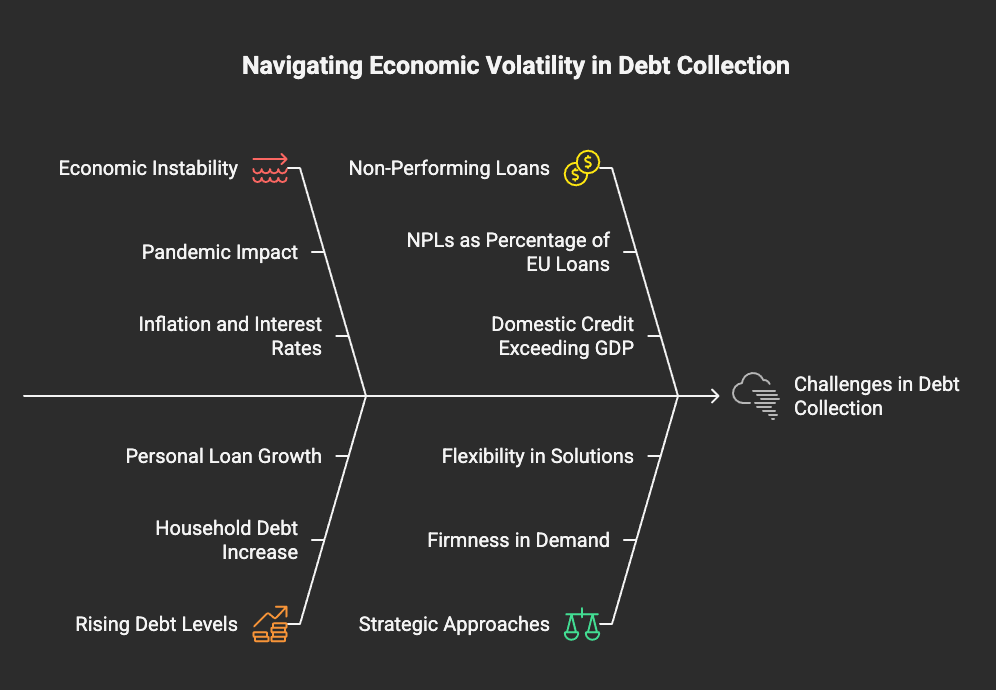
For debt collection agencies like Cosmopolite, this increasing debt level is a bit of a double-edged sword. On one hand, there's more business potential. On the other hand, recovering debts is trickier when financial stress is high. People and businesses simply have less money to pay off their obligations.
At Cosmopolite, we've finded the magic formula is combining firmness with flexibility. We don't just demand repayments—we work closely with debtors to find realistic solutions that suit everyone's financial realities. Across our offices in London, Paris, Madrid, and other major European cities, this balanced strategy has paid off, helping us successfully retrieve debts while treating debtors fairly and humanely.
At the end of the day, economic and regulatory challenges are shaping Europe's debt collection market in profound ways. To thrive, agencies need smart strategies, innovative tech solutions, and an understanding touch. Luckily, that's exactly what we at Cosmopolite Debt Collection Agency specialize in.
For more insights on how we can help your business steer these complexities, check out our Debt Collection Agency in Europe page.
Technological Innovations: Reviving or Stalling the Market?
Technology is shaking things up everywhere, and the debt collection industry in Europe is no exception. Traditional methods—think phone calls, letters, and endless paperwork—are being replaced with smarter, faster, and more efficient digital solutions. But is all this tech innovation helping the sector recover its mojo, or is it creating new challenges?
At Cosmopolite Debt Collection Agency, we've been watching—and actively embracing—these tech changes across our European offices. Here's the thing about technology: when used right, it can make debt collection less painful for everyone involved, from the debtor to the business doing the collecting.

AI and Automation: Changing Debt Recovery
The biggest game-changer in European debt collection today has to be Artificial Intelligence (AI). Forget sci-fi movies and robots taking over the world—AI in debt collection is about smart tools that help agencies predict debtor behavior, create personalized payment plans, and streamline collection processes.
Predictive analytics is a perfect example. AI-powered systems look at historical data and patterns to predict who is most likely to pay—and when. That means agencies can prioritize these debts and use custom strategies, rather than wasting time on less productive leads.
Then there's debtor segmentation. Instead of treating every debtor the same, AI helps divide them into categories based on their payment habits, financial situation, and responsiveness. This approach makes communication more targeted, respectful, and effective—ultimately improving recovery rates.
AI even figures out the optimal timing for contact, reaching out exactly when debtors are most likely to respond positively. And advanced fraud detection algorithms catch suspicious activity early, protecting agencies and their clients from financial losses.
Another fascinating advancement is natural language processing—technology that interprets sentiments and emotions in conversations. It helps agencies approach debtors with empathy, making conversations human and productive.
The results speak for themselves—AI-managed systems can handle up to a million communications (calls, texts, emails) daily, boosting debt recovery rates by as much as 80%. One recent partnership between a voice intelligence platform provider and a collection agency even saw call volumes rise by 27%, just by integrating smarter, automated voice technology.
At Cosmopolite, we're proud to integrate AI-driven solutions across our European offices, from London and Paris to Madrid and Berlin. It's not just about being tech-savvy; it's about improving our results while maintaining the human touch we’re known for.
Cloud-Based vs. On-Premise Solutions
Another key tech debate in the industry is cloud-based vs. on-premise software. Both have their strengths, and choosing between them often depends on the specific needs of the agency or the client.
Cloud-based solutions are currently leading the way, holding around 60.1% of the market share in 2024. They're especially popular with small and medium-sized businesses thanks to lower upfront costs and easy scalability. With these solutions, agencies can access real-time data from anywhere, enjoy automatic updates, and reduce overall IT infrastructure expenses. The downside? Security and compliance worries, especially when it comes to cross-border data sharing. However, advanced encryption and GDPR-compliant cloud providers are increasingly putting businesses' minds at ease.
On the other hand, on-premise solutions still hold strong appeal—particularly among larger enterprises with strict data security policies. While these solutions require higher initial investments and ongoing maintenance, they offer greater control, customization, and potentially stronger data security.

At Cosmopolite Debt Collection Agency, we don't believe in a one-size-fits-all solution. Instead, we've adopted a hybrid approach: using cloud solutions for flexibility, speed, and efficiency, while maintaining on-premise systems for highly sensitive data and specialized operations. It gives our clients—and us—the best of both worlds.
The trend, though, is clearly moving towards cloud deployment, especially as data security continues to improve. With a projected CAGR of 17.8%, cloud solutions seem set to dominate the debt collection landscape in the coming years.
Is Technology the Key to Reviving Europe's Debt Collection Market?
The big question remains: are these tech innovations revitalizing the debt collection market or complicating things further?
In our experience at Cosmopolite, technology has undeniably been a positive force. The adoption of debt collection software alone has been shown to reduce operational costs by approximately 30%. And smarter communication means higher recovery rates, happier clients, and greater compliance with regulatory frameworks like GDPR.
Of course, tech brings its own challenges, especially around security and data protection. But agencies that accept digital tools thoughtfully—rather than adopting tech just to look trendy—can gain real competitive advantages.
Want to see how we’re using technology to streamline debt collection all across Europe? Check out our dedicated page on the Debt Collection Agency in Europe to learn more about our approach.
The UK's Role in Europe's Debt Collection Market
When discussing the debt collection market size europe, it's impossible not to recognize the UK's prominent position. With a market size of approximately £1.9 billion in 2024, the UK stands out as a major player, often setting trends that other European countries soon follow.
You might be wondering, "Why the UK?" Well, it’s no surprise considering that London is one of the world's leading financial hubs. The strength and sophistication of its financial services sector has naturally created a demand for robust and efficient debt collection practices.
Plus, the UK is known for its clear (though tough!) regulatory framework. While strict regulations can seem intimidating, they actually create stability and clarity. That means agencies can focus on doing their job well—recovering debts—rather than decoding confusing rules.
The UK's debt collection scene is also tech-savvy. Agencies here were quick to accept digital change, automation, and innovative AI-driven solutions. Their willingness to invest in technology has positioned the UK market as a leader in modern debt recovery practices, something we've definitely taken advantage of at Cosmopolite. Our London office acts as a central hub where we combine cutting-edge technology with local insights, applying these best practices across our offices in France, Germany, Italy, and Spain.
Market Size and Growth Comparisons
The UK's debt collection industry is sizable and mature, but growth patterns have been pretty interesting lately. In 2024, the market grew by a respectable 5.2%, following a similar growth rate from 2019 to 2024. Interestingly, if you zoom out to the 2020-2025 period, there's actually a negative growth rate (-4.0%), reflecting the rollercoaster ride of recent years due to the pandemic, regulatory shifts, and economic uncertainty.
Other European markets are experiencing different levels of growth. Germany, for example, is projected to enjoy robust growth, with an impressive CAGR of around 12% from 2024 to 2029, thanks to its strong financial sector and increased lending activities. France is growing steadily (albeit a bit slower than Germany), driven by digital change and regulatory adjustments. Italy, meanwhile, has a very fragmented market with the highest number of debt collection businesses, making it more complex and competitive.

At Cosmopolite, we've learned that each European market has its own unique rhythm. Our approach is always custom carefully, blending local expertise with proven international standards to ensure effective debt recovery everywhere we operate.
Market Concentration and Key Players
In the UK, we're seeing moderate market concentration. Larger agencies tend to dominate because they can leverage economies of scale, technological investments, and expertise. The market is gradually consolidating, with big players steadily increasing their market shares.
This trend towards consolidation isn't unique to the UK. Across Europe, there's a noticeable shift from traditional commission-based services towards portfolio acquisition models, which offer agencies more stability and higher margins. This reflects a broader evolution towards more sophisticated debt recovery businesses.
Germany presents a fascinating mix, featuring international giants alongside specialized local firms. Meanwhile, France's market sits somewhere in the middle, moderately concentrated with strong regional businesses. Italy, with its multitude of smaller agencies, remains one of Europe's most fragmented markets.
At Cosmopolite Debt Collection Agency, we've positioned ourselves strategically across these different landscapes. Our presence in major European cities enables us to understand local nuances and blend them with global best practices. This flexibility has been key to our reputation for excellence and our impressive 4.52/5 rating from over 16,827 reviews (yes, we're pretty proud!).
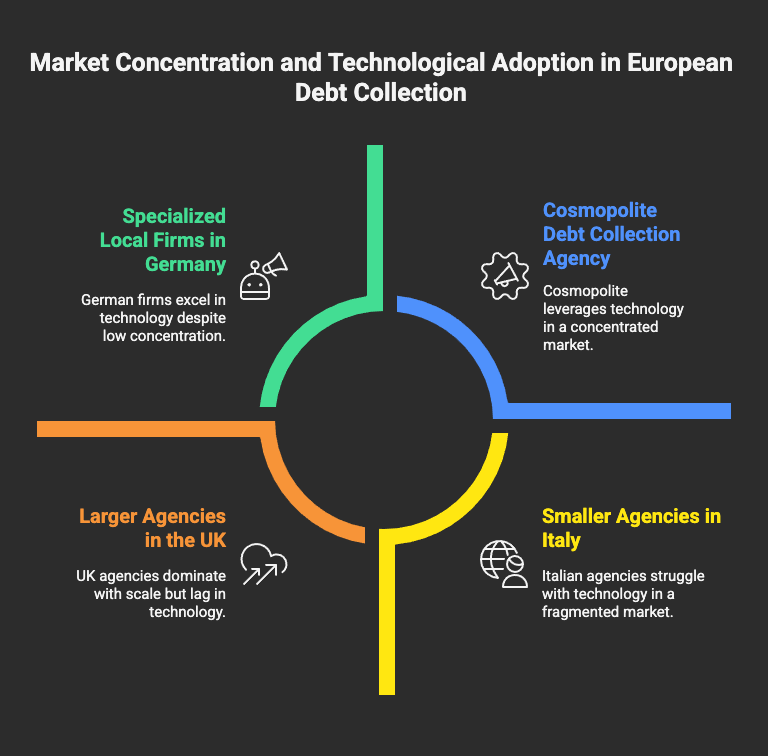
Technology is becoming the key differentiator in this competitive landscape. Agencies that successfully integrate AI-driven analytics, automation, and predictive technologies are gaining significant advantages. Smaller companies without the resources or expertise to adopt these innovations may find themselves falling behind, potentially accelerating market consolidation even further.
Curious to learn more about how we tackle debt recovery across Europe? Check out our dedicated page on Debt Collection Agency in Europe. We're always happy to chat!
Emerging Trends and Future Opportunities
The debt collection landscape across Europe is rapidly evolving, with several exciting trends shaping its future. While some of these trends bring challenges, many provide valuable opportunities for debt collection agencies and the businesses that rely on them.
AI-Driven Predictive Analytics
One of the most significant shifts we're seeing at Cosmopolite is the rise of AI-driven predictive analytics. Gone are the days when debt recovery relied solely on intuition and manual processes. Now, sophisticated technologies like machine learning and behavioral scoring models help us predict debtor behaviors more accurately. AI tools even analyze sentiment and communication patterns, allowing collection specialists to determine not just who is likely to pay, but how and when they respond best. In fact, industry data shows that agencies effectively using AI-driven analytics can boost recovery rates by as much as 40%—while also significantly lowering operating costs.
At Cosmopolite Debt Collection Agency, we've already integrated advanced AI systems into our workflow, helping our teams across Europe handle cases faster and more effectively. (And yes, it's true—we now sometimes trust algorithms more than our gut instincts!)
Cross-Border Debt Collection Services
Another exciting development is the increasing need for cross-border debt collection services. As businesses become more globalized, unpaid debts often span multiple European jurisdictions. That's where agencies with a strong presence across the continent—offering multilingual skills and deep cultural understanding—have a real advantage.
This trend fits perfectly with Cosmopolite's strengths. With offices in London, Paris, Madrid, and key cities across Germany, Italy, and France, we have local experts ready to steer complex, cross-border regulations and ensure compliance with data protection laws like GDPR. Businesses gain peace of mind knowing their international receivables are managed by specialists who truly speak their language—sometimes quite literally!
SME Adoption of Debt Collection Solutions
Times are changing for smaller businesses too. Traditionally, larger firms dominated the debt collection landscape. But now, more and more SMEs are adopting professional debt recovery solutions—particularly thanks to the convenience and affordability of cloud-based platforms. Subscription-based pricing models have made advanced debt recovery tools accessible to businesses that previously couldn't afford them.
In fact, SMEs now account for about 55% of the debt collection market share in Europe as of 2024. Markets like the UK and Germany are leading the charge in SME adoption, as small businesses increasingly realize the value of quickly turning unpaid receivables into revenue. At Cosmopolite, we've created custom solutions for SMEs, combining our proven negotiation strategies with easily scalable technology—because small businesses deserve big results too.

Ethical and Customer-Centric Collection Approaches
There's another positive change happening in European debt collection: a powerful shift towards more ethical and customer-centric approaches. Today's debtors expect respectful communication and flexible payment options—after all, financial difficulties can happen to anyone.
At Cosmopolite, we've seen how treating debtors with dignity and empathy not only boosts compliance but also leads to higher overall recovery rates. Our highly-rated professional service (scoring 4.52/5 from over 16,827 reviews—yes, we're blushing!) shows the effectiveness of compassionate yet firm debt management strategies. Digital self-service solutions further empower debtors to take responsibility and manage repayments on their terms, enhancing trust and cooperation.
Integration with CRM Systems
Finally, another emerging trend is the growing integration of debt collection platforms with Customer Relationship Management (CRM) systems. This integration provides businesses a unified customer view by incorporating payment history and collection activities into their broader customer communication strategy. It allows for consistent messaging and seamless data sharing among sales, customer service, and collections teams.
We at Cosmopolite encourage our clients to adopt this integrated approach. After all, keeping a customer engaged—even during collections—can mean the difference between a one-off payment and a long-term relationship.
With trends like these shaping the debt collection market size europe, we see plenty of reasons for optimism. Learn more about how Cosmopolite Debt Collection Agency can turn your unpaid receivables into revenue—it’s what we do best.
Frequently Asked Questions about the Debt Collection Market Size in Europe
What Is the Current Market Size of the Debt Collection Industry in Europe?
The current debt collection market size Europe sits at approximately €19.6 billion in 2024. This number covers everything from debt collection agencies to credit bureaus and even specialized financial services across the region.
Interestingly, the industry has had a bit of a rocky ride lately with a revenue decline averaging 3.8% annually between 2019 and 2024. Despite these bumps in the road, there's plenty of optimism ahead—especially in the technology-driven segments.
Take the debt collection software market, for instance. In 2024, this segment alone is worth USD 1.64 billion and has some impressive momentum. Analysts expect that by 2033, its value could reach anywhere from USD 2.9 billion to USD 4.31 billion, growing at annual rates between 9.6% and 11.32%. Pretty exciting stuff!
Of course, not all European markets are created equal. Here's the quick breakdown for 2024:
- UK: £1.9 billion (a major player!)
- Germany: Around €2.7 billion (strong growth potential)
- France: Roughly €1.8 billion (steady and digital-savvy)
- Italy: Approximately €1.4 billion (lots of smaller agencies)
- Spain: About €1.1 billion (heading toward digitalization)
These figures reflect the unique financial environments, economic conditions, and regulatory scenes across each country. At Cosmopolite Debt Collection Agency, we've seen first-hand how these variations shape our strategies across our European offices.

How Is Technology Changing Debt Collection in Europe?
Technology is reshaping Europe's debt collection industry in a massive way—think less paperwork, fewer phone calls, and smarter ways of working.
Automation and AI are among the biggest game-changers. AI-driven platforms can now handle huge volumes of calls and texts every day, significantly increasing recovery rates—up to 80% more effective in some cases. It's like having a tireless digital assistant working around-the-clock (without coffee breaks!).
Speaking of convenience, the move toward cloud-based solutions is also a big deal. With over 60% of the market adopting cloud platforms in 2024, smaller businesses especially benefit from the affordability, adaptability, and scalability these solutions provide. It's a bit like choosing streaming services over old-school cable—less hassle and more flexibility.
Another exciting development is predictive analytics, which lets collection agencies anticipate debtor behavior better than ever. By analyzing data, these tools pinpoint which accounts are most likely to pay, helping agencies prioritize efforts effectively—saving time and increasing recovery success.
But tech isn't just about efficiency; it's also enhancing communication. Digital communication platforms enable seamless interactions across multiple channels, from text messages to emails, making the entire collection process smoother and friendlier for everyone involved.
Last but not least, automated compliance management ensures agencies meet complex regulations like GDPR without breaking a sweat. Agencies that accept tech-driven compliance significantly reduce the risk of costly slip-ups.
At Cosmopolite, we're big believers in these technological advancements—and we've integrated them across all our European offices. It's all about working smarter, not harder.
What Are the Main Challenges Facing the European Debt Collection Market?
Running a debt collection agency in Europe isn't without its problems. From strict regulations to economic uncertainty, the industry faces significant challenges.
One of the biggest obstacles is Europe's regulatory complexity. Regulations like GDPR mean agencies have to juggle multiple compliance rules across different countries. Keeping up can be tricky—and costly.
Speaking of economics, ongoing economic volatility continues to keep collection agencies on their toes. Inflation, rising interest rates, and financial instability mean people and businesses are juggling more debt—and often have a harder time paying it back.
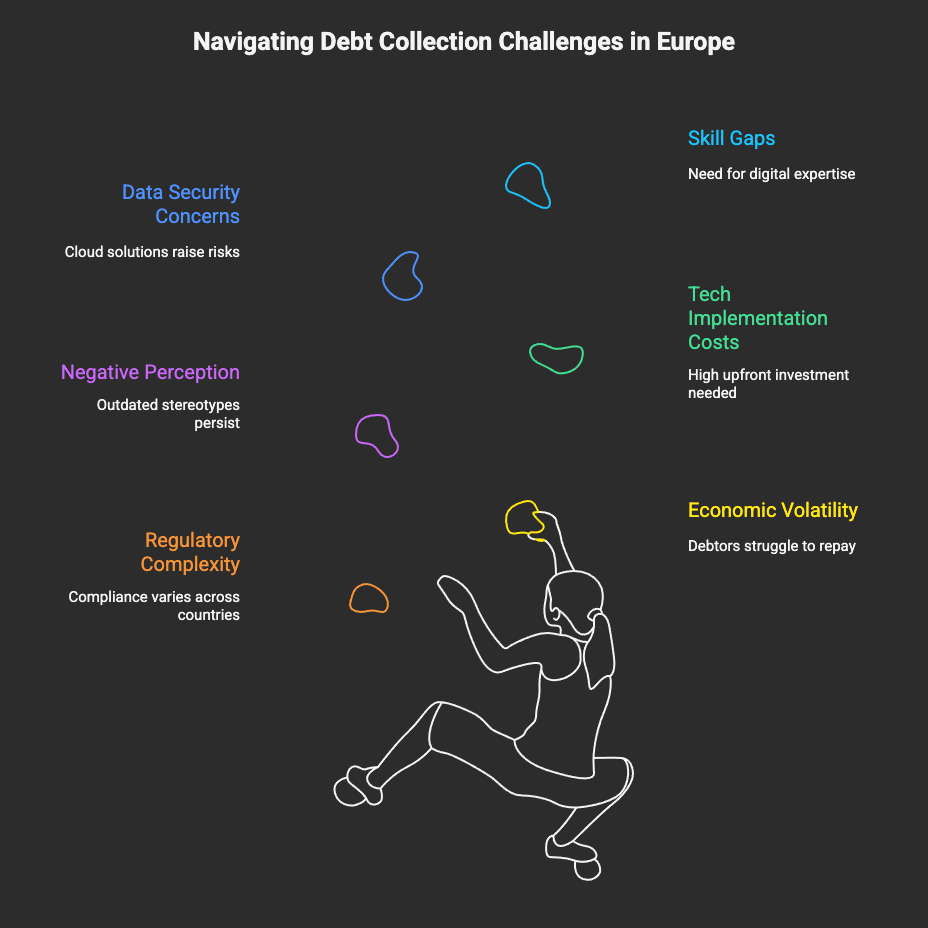
Another constant battle is the negative public perception faced by debt collection agencies. Unfortunately, outdated stereotypes of aggressive collectors still linger. At Cosmopolite, we work hard to break this mold by demonstrating respectful, professional debt recovery practices (our 4.52/5 rating from over 16,827 reviews shows we're doing something right!).
Embracing new tech is great—but it's not without its challenges. High initial technology implementation costs can feel daunting, especially for smaller agencies or businesses with tight budgets. Additionally, moving toward cloud-based solutions can raise legitimate data security concerns, making it essential to choose technology partners carefully.
Finally, the industry's rapid change creates skill gaps. Agencies need employees who understand digital tools, data analysis, and compliance frameworks. Finding people with these in-demand skills can be challenging.
At Cosmopolite Debt Collection Agency, we're proactively tackling these issues through continuous investment in technology, employee development, and compliance expertise. Our network of offices across major European markets (including London, Paris, Madrid, and various cities in Germany and Italy) puts us in a prime position to steer the European landscape with confidence.
For more detailed insights on debt recovery in Europe, visit our dedicated page: Debt Collection Agency in Europe.
Conclusion
The European debt collection market stands at a fascinating crossroads—and let's be honest, it's anything but boring right now. With the debt collection market size Europe valued at roughly €19.6 billion in 2024, predictions suggest there's plenty of life left in this sector. Despite experiencing a revenue dip (with a CAGR of -3.8% between 2019 and 2024), the market is expected to bounce back strongly, with projected growth rates of around 11.32% from 2025 to 2033. So, is the industry losing its mojo? Definitely not—but it is clearly undergoing some significant changes.
One of the biggest shifts we're witnessing is the rise of technology, which has become the heartbeat driving growth in the market. Agencies that accept AI, automation, and cloud-based solutions are proving to be frontrunners. These solutions aren't just flashy tech—they genuinely streamline processes, improve compliance, and significantly boost recovery rates. In fact, the smartest debt collection firms know that technology isn't just an option anymore—it's essential.
Another key piece of the puzzle is how businesses adapt to regulations. Take GDPR, for instance: some see it as an annoying headache, but smart agencies view it as a chance to build trust. At Cosmopolite Debt Collection Agency, we've welcomed GDPR compliance as an opportunity to improve data management, security, and transparency across all our locations, from London to Madrid.
Then there's geography—because in the debt collection business, location really does matter! The UK remains at the forefront, leading Europe's debt collection market with its mature financial services sector and proactive digital strategies. But don’t sleep on Germany—this market is showing impressive growth, powered by its robust economy and increasing adoption of tech-based solutions.
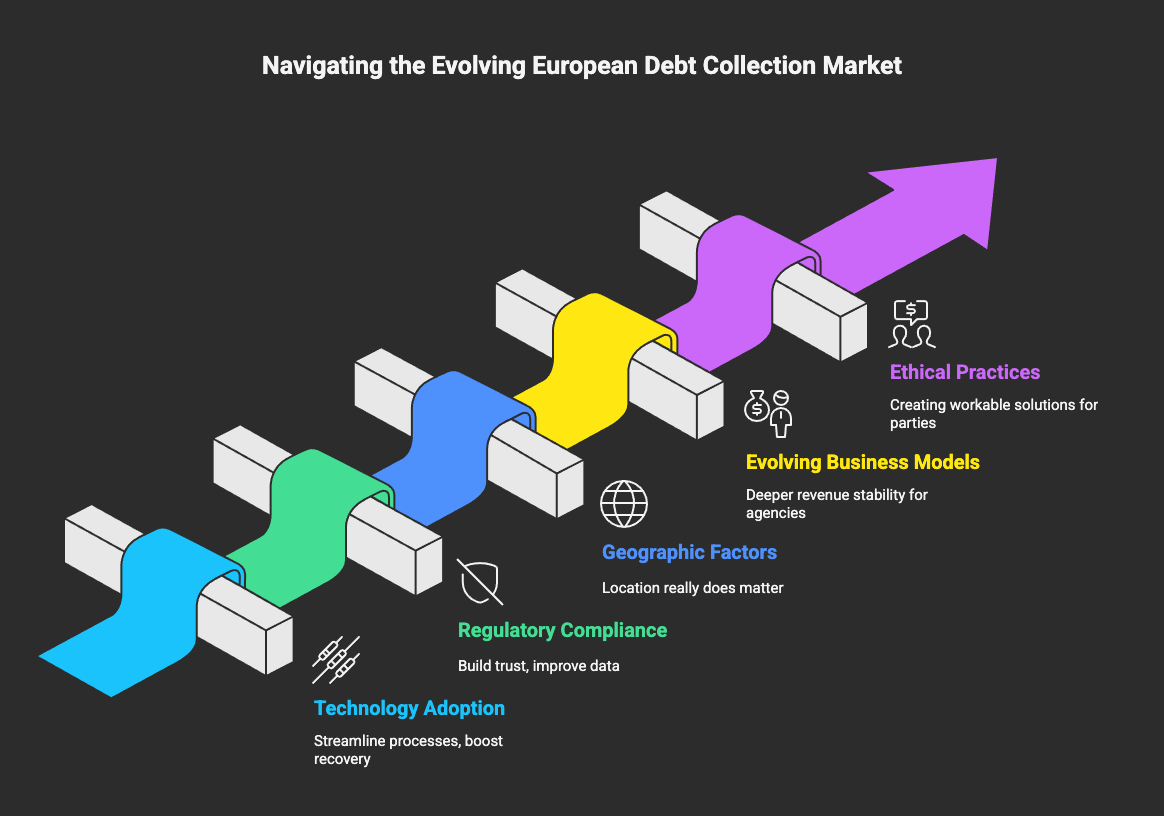
The debt collection industry is evolving, and that’s a good thing. We’re seeing a steady shift from the old fee-based models toward portfolio acquisition, where agencies purchase debt portfolios directly. This creates more stability for agencies and opens up fresh opportunities for clients as well.
What’s especially exciting is the growing recognition that debt recovery isn’t about pressure or intimidation—it’s about people. More agencies are embracing ethical, customer-focused practices that aim to find workable solutions for everyone involved. At Cosmopolite, this has always been at the heart of what we do. It’s why we’ve earned such strong feedback (4.52/5 from more than 16,800 reviews): we combine skilled negotiation with legal action only when absolutely necessary.
We’re proud to have embraced these changes wholeheartedly. Our teams across London, Paris, Madrid, and other key European cities are constantly looking forward—investing in new technologies, training, and strict compliance standards. This ensures our clients can turn unpaid receivables into valuable revenue, while keeping costs under control.
So, is the European debt collection market facing challenges? Absolutely. But slowing down? Not at all. In fact, it’s getting smarter, stronger, and more efficient. We see an industry full of opportunity—for growth, for innovation, and for building better, more respectful relationships with customers and debtors alike.
If you’re wondering how Cosmopolite can support your business in navigating these evolving debt collection trends across Europe, we’d love to chat. For further background on the broader field of debt collection, see Debt collection on Wikipedia. For more information about our custom services, visit our Debt Collection Agency in Europe page.






